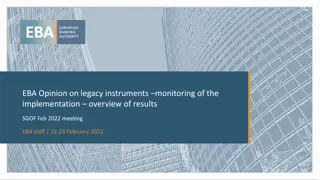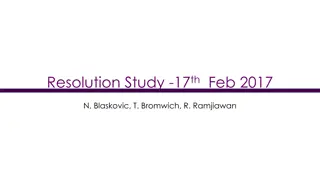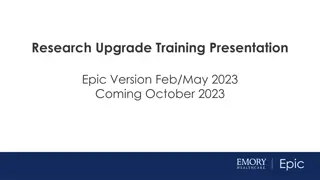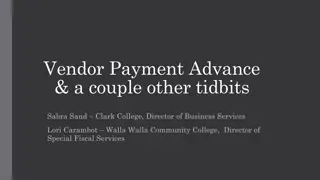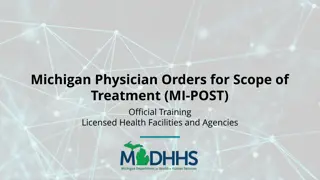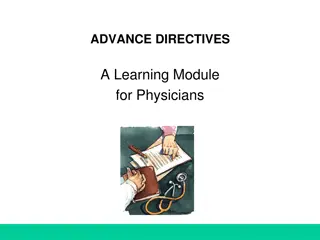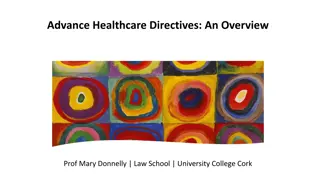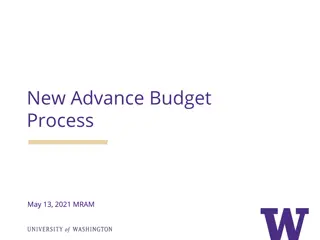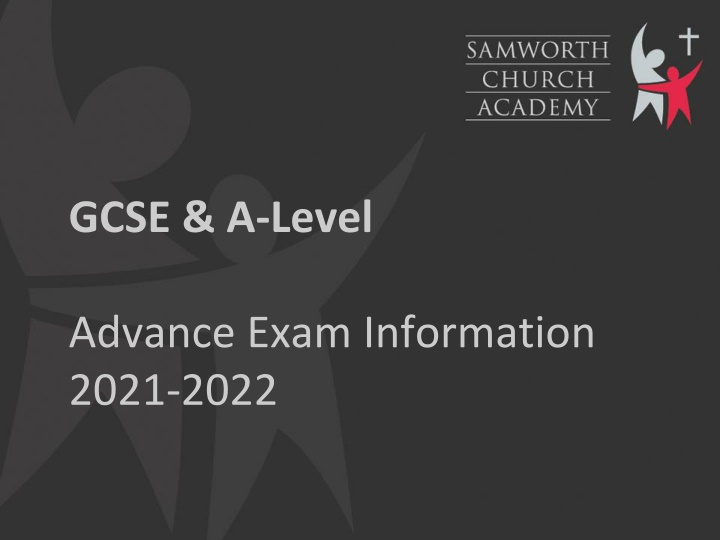
Advance Information for GCSE and A-Level Exams 2021-2022
Advance information for GCSE and A-Level exams provides details on what will be assessed in the examination papers, supporting revision but not covering every aspect of the exams. It does not change the structure of exams, is available for most subjects, and should be used to aid revision without narrowing teaching and learning.
Download Presentation

Please find below an Image/Link to download the presentation.
The content on the website is provided AS IS for your information and personal use only. It may not be sold, licensed, or shared on other websites without obtaining consent from the author. If you encounter any issues during the download, it is possible that the publisher has removed the file from their server.
You are allowed to download the files provided on this website for personal or commercial use, subject to the condition that they are used lawfully. All files are the property of their respective owners.
The content on the website is provided AS IS for your information and personal use only. It may not be sold, licensed, or shared on other websites without obtaining consent from the author.
E N D
Presentation Transcript
GCSE & A-Level Advance Exam Information 2021-2022
What is advance information? Advance information is intended to communicate in advance some of the aspects of the specification that will be assessed in the examination papers. The breadth, depth and presentation of the advance information will vary between subjects to reflect their different characteristics. The information will detail the focus of particular aspects of the examination; for example, the content, contexts, texts, topics, sub- topics, themes and skills that will be assessed in the 2022 exams. This information will look different across a variety of subjects. It will support revision in the time before the examination.
Will advance information change how exams look/are structured? No. Advance information does not require any changes to a question paper s usual structure, which means that the examination assessments will: - Be familiar to teachers and students. - Allow continued relevance of associated assessment and teaching resources, including past papers. - Support student confidence in minimising the unexpected in the layout or structure of question papers.
Which subjects have advance information? It will be available for the majority of GCSE, AS and A level subjects. There will be advance information for all subjects except GCSE English Literature, History, Ancient History, Geography and Art and Design, and A and AS level Art and Design. The exceptions are either because of the nature of assessments in those subjects (assessment is by NEA in art and design qualifications) or because, following consultation by DfE and Ofqual, it has been decided that advance information will not be provided in subjects where optionality (students having a choice) is being introduced for 2022.
Does advance information cover everything on exams? NO. The advance information will not always detail everything that is in the examination. In some cases this would risk good education, progression, or fair results; in others it would be unhelpful to teachers and students, for example by listing topics that could lead to excessive teaching or revision on areas that are worth few marks.
How and when should advance information be used? - - Advance information can be used from the point of release. It can be used flexibly by centres to achieve its purpose of supporting revision. It should not, however, be used to narrow teaching and learning. It can be used by teachers in supporting their students revision and referred to by students in their revision and final examination preparation. It cannot be brought into the examinations. It will not be at a level that allows questions to be predicted or answers prepared. Preparation should continue to focus on knowledge and understanding that can be applied appropriately in the context of unseen examination questions. - - - -
GCSE Advance Information Subject: Religious Studies GCSE Faith Paper; Paper 1 Themes paper; paper 2. No information Relationships Crime and punishment Conflict Religion and life 6 marks for spelling, punctuation and grammar (SPaG) in Component 1 Both 12 mark, question 5 will be SPAG 3 marks for spelling, punctuation and grammar in Component 2. 1 of the 12 marks Q5 from the 4 will be SPAG
GCSE Advance Information Subject: Religious Studies GCSE Christianity Beliefs and teachings The nature of God: the oneness of God and the Trinity: Father, Son and Holy Spirit. Different Christian beliefs about creation including the role of Word and Spirit (John 1:1 3 and Genesis 1:1 3). Different Christian beliefs about the afterlife and their importance, including: resurrection and life after death; judgement, heaven and hell. Beliefs and teachings about: the crucifixion, resurrection and ascension the means of salvation, including law, grace and Spirit the role of Christ in salvation including the idea of atonement.
GCSE Advance Information Subject: Religious Studies GCSE Christianity Practices The role and meaning of the sacraments: the sacrament of baptism and its significance for Christians; infant and believers' baptism; different beliefs about infant baptism. The role and importance of celebrations including: the celebrations of Christmas and Easter, including their importance for Christians in Great Britain today. The place of mission, evangelism and Church growth. The importance of the worldwide Church including: working for reconciliation how Christian churches respond to persecution
GCSE Advance Information Subject: Religious Studies GCSE Judaism Beliefs and teachings The nature of God: God as Law-Giver and Judge, loving and merciful. The nature and role of the Messiah, including different views on the role and importance of the Messiah. The promised land and the Covenant with Abraham, Genesis 12:1 3. The Covenant at Sinai and its importance including the role of Moses and the Ten Commandments, Exodus 20:1 17. Key moral principles including justice, healing the world, charity and kindness to others.
GCSE Advance Information Subject: Religious Studies GCSE Judaism Practices The synagogue and its importance. Public acts of worship including: synagogue services in both Orthodox and Reform synagogues. Shabbat in the home and synagogue and its significance. Rituals and their significance: Bar and Bat Mitzvah. Dietary laws and their significance, including different Jewish views about their importance. kosher and trefah. Festivals and their importance for Jews in Great Britain today, including the origins and meaning of: Rosh Hashanah and Yom Kippur.
GCSE Advance Information Subject: Religious Studies GCSE Islam Beliefs and teachings The nature of God: omnipotence, beneficence, mercy, fairness and justice/Adalat in Shi a Islam, including different ideas about God s relationship with the world: immanence and transcendence. Angels, their nature and role, including Jibril and Mika il. Risalah (Prophethood) including the role and importance of Adam, Ibrahim and Muhammad. The holy books: Qur an: revelation and authority the Torah, the Psalms, the Gospel, the Scrolls of Abraham and their authority. The imamate in Shi a Islam: its role and significance.
GCSE Advance Information Subject: Religious Studies GCSE Islam Practices Salah and its significance: how and why Muslims pray including times, directions, ablution (wudu), movements (rak ahs) and recitations; salah in the home and mosque and elsewhere; Friday prayer: Jummah; key differences in the practice of salah in Sunni and Shi a Islam, and different Muslim views about the importance of prayer. Zakah: the role and significance of giving alms including origins, how and why it is given, benefits of receipt, Khums in Shi a Islam. Hajj: the role and significance of the pilgrimage to Makkah including origins, how hajj is performed, the actions pilgrims perform at sites including the Ka aba at Makkah, Mina, Arafat, Muzdalifah and their significance. Jihad: different understandings of jihad: the meaning and significance of greater and lesser jihad; origins, influence and conditions for the declaration of lesser jihad. Festivals and commemorations and their importance for Muslims in Great Britain today, including the origins and meanings of Id-ul-Adha, Id-ul-Fitr, Ashura.
A-Level Advance Information Subject: Religious Studies paper 1 religion Section A: questions in this section will be taken from Theme1 Religious figures and sacred texts, which consists of the following six sub-themes: Theme 1A: Jesus his birth Theme 1B: Jesus his resurrection Theme 1C: The Bible as a source of wisdom and authority in daily life Theme 1D: The Bible as a source of wisdom and authority Theme 1E: The early church (in Acts of the Apostles) Theme 1F: Two views of Jesus Section B: questions from this section will be taken from any three of the following six sub-themes: Theme 2A: Religious concepts the nature of God Theme 2B: Religious concepts the Trinity Theme 2C: Religious concepts the Atonement Theme 2D: Religious life faith and works Theme 3C: The relationship between religion and society: religion, equality and discrimination Theme 3D: The relationship between religion and society: respect and recognition and the ways that religious traditions view other religions and non-religious worldviews and their truth claims. Historical developments in religious thought challenges from secularisation.
A-Level Advance Information Subject: Religious Studies GCE Paper 2; Philosophy Section A: questions in this section will be taken from Theme 4: Religious language Theme 4A: Inherent problems of religious language Theme 4B: Religious language as cognitive (traditional religious view), but meaningless (Logical Positivists view) Theme 4C: Religious language as non-cognitive and analogical Theme 4D: Religious language as non-cognitive and symbolic Theme 4E: Religious language as non-cognitive and mythical Theme 4F: Religious language as a language game Section B: questions from this section will be taken from any three of the following six sub-themes: Theme 1D: Deductive arguments origins of the ontological argument Theme 1E: Deductive arguments developments of the ontological argument Theme 2D: Religious belief as a product of the human mind Sigmund Freud Theme 2E: Religious belief as a product of the human mind Carl Jung Theme 3E: Miracles the definitions of Theme 3F: A comparative study of two key scholars from within and outside the Christian tradition and their contrasting views on the possibility of miracles
A-Level Advance Information Subject: GCE Paper 3 ethics Theme 1A: Divine Command Theory Theme 1B: Virtue Theory Theme 1C: Ethical Egoism Theme 1D: Meta-ethical approaches Naturalism Theme 1E: Meta-ethical approaches Intuitionism Theme 1F: Meta-ethical approaches Emotivism Section B: questions from this section will be taken from any three of the following six sub-themes: Theme 2A: St Thomas Aquinas Natural Law laws and precepts as the basis of morality Theme 2C: Aquinas Natural Law application of the theory Theme 3E: John Stuart Mill's development of Utilitarianism types of pleasure, the harm principle and the use of rules Theme 3F: Bentham s Act Utilitarianism and Mill s Rule Utilitarianism application of the theory Theme 4B: Concepts of determinism Theme 4C: The implications of predestination / determinism
What happens next? Completion of teaching of the specification Completion of coursework/portfolio work Targeted homework tasks Teaching focused on advance information areas Intervention focused on advance information areas Timed exam past paper practice Student completion of revision materials Student completion of feedback to mock exams Any issues or questions please ensure you ask?


